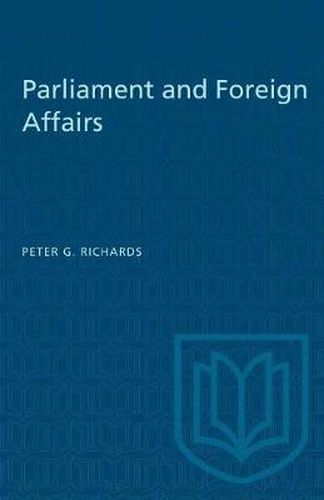Readings Newsletter
Become a Readings Member to make your shopping experience even easier.
Sign in or sign up for free!
You’re not far away from qualifying for FREE standard shipping within Australia
You’ve qualified for FREE standard shipping within Australia
The cart is loading…






This is the first full-scale study of how the British Parliament deals – or tries to deal – with questions of foreign policy. The problem of how a democracy should control its external relations was widely discussed during and after the First World War. The dangers of war in the atomic age mean that a re-examination of the problem is an urgent necessity.
Parliament review domestic problems in great detail, but what can it do when faced with an international crisis such as the Soviet-U.S. confrontation over Cuba? Dr. Richards makes a searching enquiry into the special reasons for legislative impotence in this field – the weakened position of Britain in world politics, the secrecy that surrounds diplomacy, the lack of information available to M.P.s and the restraints imposed by Parliamentary procedure. Some of these weaknesses cannot be overcome, but he suggests a number of measures to strengthen the authority of Parliament and enable it to represent public opinion more effectively. His book is an important contribution to the current discussion on the need for Parliament to make a drastic overhaul of its traditions and procedures.
$9.00 standard shipping within Australia
FREE standard shipping within Australia for orders over $100.00
Express & International shipping calculated at checkout
This is the first full-scale study of how the British Parliament deals – or tries to deal – with questions of foreign policy. The problem of how a democracy should control its external relations was widely discussed during and after the First World War. The dangers of war in the atomic age mean that a re-examination of the problem is an urgent necessity.
Parliament review domestic problems in great detail, but what can it do when faced with an international crisis such as the Soviet-U.S. confrontation over Cuba? Dr. Richards makes a searching enquiry into the special reasons for legislative impotence in this field – the weakened position of Britain in world politics, the secrecy that surrounds diplomacy, the lack of information available to M.P.s and the restraints imposed by Parliamentary procedure. Some of these weaknesses cannot be overcome, but he suggests a number of measures to strengthen the authority of Parliament and enable it to represent public opinion more effectively. His book is an important contribution to the current discussion on the need for Parliament to make a drastic overhaul of its traditions and procedures.